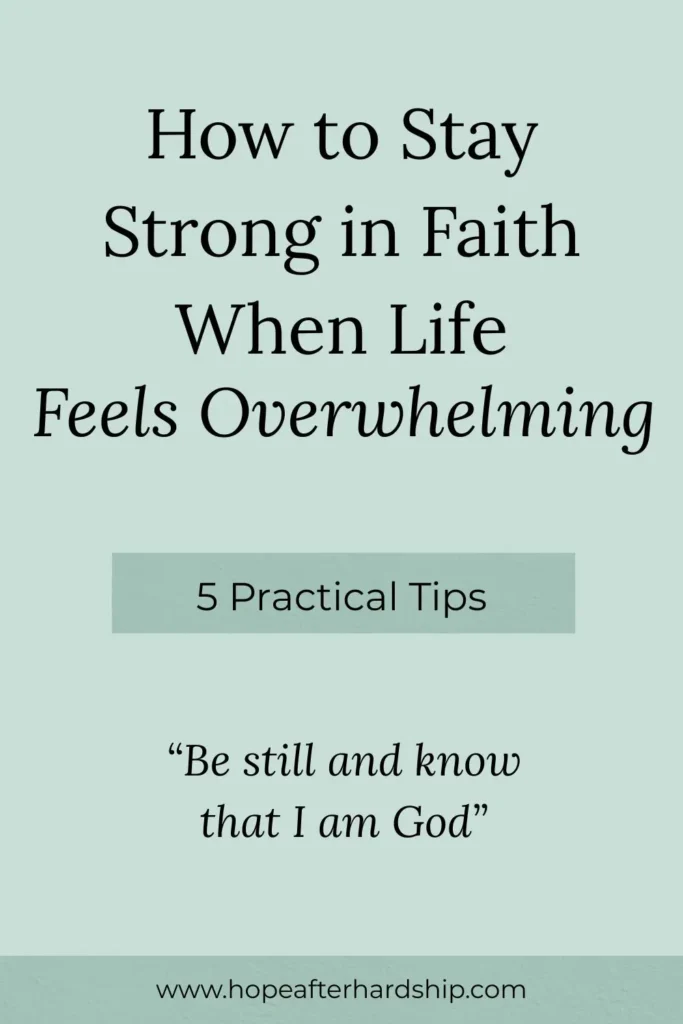How to Stay Strong in Faith When Life Feels Overwhelming
If you’re feeling weighed down by loss, worry, or heartache, you’re definitely not alone. As a Christian woman, there are days when holding on to peace and hope feels like an impossible feat. Learning how to stay strong in faith isn’t about making sure life is easy, it’s about drawing closer to Christ when everything feels heavy. In the sections ahead, I’ll share what helps me keep faith during hard times, along with ways to build faith in hardship, prayers, and scripture that steady the heart. I invite you to reflect on how you can let your story and your faith keep growing.

Table of Contents
Identify Overwhelm that Challenges Your Faith
Life’s heaviest moments can sneak up when you least expect them. Sometimes, you know exactly what’s wrong. Other times, things just feel off. Understanding where those feelings are coming from is one of the first steps toward learning how to stay strong in faith when life feels overwhelming. By spending a few minutes to unpack your emotions, doubts, and burdens, you give your spirit space to breathe.
Identify Emotional Triggers
Our hearts are sensitive. A memory, a hard conversation, or even an ordinary day can stir up towering emotions. When you feel anxiety rising or sorrow pressing down, try this:
- Pause for a moment.
- Notice what you’re feeling: sadness, anger, fear, or maybe numbness.
- Write down what sparked the emotion. Was it a news headline, a friend’s comment, a date on the calendar?
You could even look for patterns by using a table on your phone like this:
| Trigger | Feeling | Impact |
|---|---|---|
| Anniversary | Grief | Hard to speak out loud |
| News Stories | Anxiety | Restless mind |
| Family Arguments | Anger | Raised voice |
As you list your feelings and their triggers, notice the impact they have on you. These things impact your faith as well. Do you pull away from prayer? Do you feel unable to worship? Recognizing these patterns is a gentle invitation to bring your whole self to Christ.

How to Acknowledge Spiritual Doubts in Hard Times
When life gets hard, it’s normal to wrestle with spiritual questions. Maybe you wonder if God hears your prayers or if He even notices your pain. Admitting these doubts should not be shameful. It’s just part of being an imperfect human. In scripture, even strong prophets voiced their doubts. Remember how David cried out in the Psalms, asking, “How long wilt thou forget me, O Lord? for ever? how long wilt thou hide thy face from me?” (Psalm 13:1).
An easy way to start is to take out a notebook or a piece of paper and write down a doubt or question that keeps echoing in your mind. Don’t hold back—this isn’t for anyone else’s eyes. When you get these thoughts out on paper, you can choose for them to live there instead of in your mind. You don’t have to figure it all out right now.
Turn Your Worries into Prayers: How to Journal Your Burdens
It’s easy for worries to stack up until you’re buried. When this happens, journaling can shift your perspective. Try turning worries into prayers with a simple exercise:
- Open your journal and complete this prompt: “Today I lay these burdens at Your feet, Lord…”
- List out everything that weighs on your heart, big or small.
By naming each worry, you transform private fear into an open, honest prayer. This is a practice I return to often. Sometimes, I write fast and messy. Other times, the words come slow. Either way, something changes when I share my burdens with God. The load feels lighter, and my trust grows deeper.

Root Yourself in Scripture When Life Feels Heavy
When life weighs on your heart, turning to scripture can help you feel steadier. It’s not just a checkbox on a list—anchoring yourself in God’s word brings real peace, clarity, and perspective. Whether you’re struggling with grief or just tired from another long day, these practices can help you remember that you’re not alone. Building your faith on scripture will become a lifeline, grounding you when everything else feels uncertain.
Daily Scripture Practices: A Simple Start to the Day
Giving a few moments each morning to scripture can set the tone for everything that follows. Even if you’re short on time or heavy in spirit, try this three-step routine:
- Morning verse: Choose one verse to start your day. Write it on a sticky note or save it on your phone. A favorite of mine is Isaiah 41:10 (KJV), “Fear thou not; for I am with thee: be not dismayed; for I am thy God.” Let it greet you before emails or calendars do.
- Short meditation: After reading your verse, sit quietly for a minute. Slow your breathing. Let the words filter through whatever is pressing on your heart. You don’t need perfect focus—just a willingness to let scripture speak to you.
- Reflective question: Ask yourself, “How does this verse shape my outlook today?” Write your response or just carry it in your mind. Sometimes, asking a thoughtful question makes truth stick more than reading quickly and moving on.
Prayer Journaling: Creating a Record of God’s Faithfulness
Prayer journaling is basically what it sounds like- journaling your prayers. It’s cool because it can help you remember the answers God has given you. When I started writing down my prayers, I was shocked by how much it changed the way I recognized both my needs and the small, steady answers that followed.
Here’s what I found helpful:
- Start each entry with honesty. Tell God what’s really on your mind, even if your thoughts are messy or sad.
- Record specific requests. Put dates beside your prayers so you can track when you asked.
- Leave space for answers. Return and jot down how God responds, whether it’s a direct answer, a feeling of comfort, or an unexpected change in your life.
Reviewing past entries becomes a source of hope when faith feels thin. You realize prayers that once seemed ignored have found quiet answers. Your journal turns into a personal testimony—proof of how God shows up, even (and maybe even especially) in hard seasons.

Memorizing Promises: A Three-Step Method
When your thoughts are swirling, having scripture memorized is like carrying a flashlight in the dark. You don’t have to remember chapters at a time. A few key promises can make a big difference. Here’s a method that’s worked for me:
- Pick a meaningful promise. Start with a verse that speaks to a current struggle. “Come unto me, all ye that labor and are heavy laden, and I will give you rest” (Matthew 11:28 KJV) is one I return to often.
- Break it down. Write the verse out by hand. Say it aloud in the morning and at night. Whenever you feel anxious or distracted, recite part of the verse until it feels familiar.
- Connect it to daily life. Think about situations when the verse helps. For example, if you’re facing an overwhelming to-do list, pause and whisper the promise to yourself. Over time, the words will settle into your mind and come back when you need them most.
Having a few verses tucked away builds a quiet, strong faith for days when life feels heavier than you can carry. Your habits don’t have to be perfect. God’s grace will meet you where your efforts are.
Join a Faith Strengthening Community
You do not have to shoulder heartache on your own. When everything feels too heavy, having a community of faith can carry you when you cannot stand by yourself. God often works through the people around us, sending comfort, truth, and even little miracles in unexpected ways. Building a supportive faith community is about finding real support, honest friendship, and safe spaces to ask for help while trying to stay strong in faith. Here is how you can make that faith community a reality.

Seek Encouragement from Fellow Believers
Asking for help is not easy, especially when you feel raw or worn down. But faith was never meant to be lived alone. When you let others in, you give them a chance to love you as Christ would.
You could start small:
- Ask a trusted friend or two to pray with you.
- Tell your Sunday School group or church friends what you are facing and ask for someone to be your prayer partner this month.
- Join a church-based small group or support circle, even if you have never tried it before.
Small groups make space for honest talk. You can share what actually hurts, listen to others, and find prayers tailored to your needs—not just polite words, but real support. Sometimes, just hearing someone pray out loud for you gives you strength to keep going. You do not need to have it all together; bring your questions, tears, or even silence. The right people will understand.
Join Online Faith Forums
In-person support is wonderful, but sometimes you need a safe place to be heard from home. Online Christian forums can connect you with people who “get it”—women who know grief, struggle, and everyday faith. These spaces can give hope at 2 a.m. when your heart aches and you need someone who will listen.
Here are a few safe forums and communities that focus on women, grief, and faith:
- GriefShare Online Groups: GriefShare offers session-based support for anyone facing loss. If you are not comfortable sharing face-to-face, their online groups are welcoming and easy to join.
- Sisters in Christ Facebook Groups: Many faith-based Facebook groups exist for Christian women walking through grief or hardship. Moderators usually create strong guidelines to keep discussions safe and respectful. There are many- search and see which is a good fit for you.
- Christian Forums’ Grief Support: This long-running forum has special channels for women and for working through grief from a faith perspective.
Online communities give you a way to share prayer requests, find Bible study buddies, or just vent on hard days. You can offer support to others, too—it feels less lonely when you realize you are not the only one struggling to figure out how to stay strong in faith.

Daily Practices that Don’t Let You Drift From God
Building strong spiritual habits helps you hold fast to your faith, even on days when hope feels far away. These practices can give you a sense of steadiness and calm, helping you tune in to God’s voice and remember that you’re never truly alone. When you’re figuring out how to stay strong in faith during overwhelming seasons, small daily acts can fuel your spirit. Here are a few habits that have made a difference for me and many others.
Consistent Worship
Daily worship doesn’t need to be hours long or perfectly planned. Even a short, dedicated time to sing, pray, or listen to music can reset your heart. If mornings are busy, try weaving worship into your drive, your walks, or when you’re folding laundry.
Consider creating a short worship playlist with songs that lift your spirit and invite peace. Here’s a sample five-song playlist that works well in about 20 minutes:
- “Come Thou Fount of Every Blessing”
- “It Is Well with My Soul”
- “Peace in Christ”
- “Be Still My Soul”
- “I Need Thee Every Hour”
During this worship time, let yourself be real with God. Offer thanks, whisper prayers, or just listen to the truths in the music. If you prefer, you could read a favorite hymn or scripture instead. Over time, this small habit can anchor you, making it easier to return to God when life gets loud or hard.
Service to Others
Serving others might sound impossible when you’re grieving or feeling lost. But reaching out—sometimes in small, quiet ways—can actually help lift heavy feelings. It brings purpose to your days when everything else feels broken.
Helping someone else reminds you that pain isn’t the only story in your life. You start to see how God still works through you, even in sadness. The simplest acts matter:
- Texting a friend to check in
- Dropping a meal at someone’s doorstep
- Sending a note of encouragement
- Holding space for someone’s worries
Each act, no matter how small, can help you remember you have something to offer. Your own heartache turns into a bridge of comfort for someone else. Service doesn’t fix pain, but it does invite purpose back into your life, which helps you learn how to stay strong in faith even when things look bleak.

Reflective Silence
Quiet time with God is where real soul rest happens, far beyond words or noise. Learning to sit in silence, even for a few minutes, can open your spirit in a healing way.
Here’s a simple guide to begin:
- Find a spot where you feel safe and undisturbed.
- Set a timer for five minutes. This keeps you from worrying about time.
- Close your eyes, slow your breathing, and repeat a simple prayer or verse. For example, whisper, “Be still, and know that I am God” (Psalm 46:10).
- As thoughts intrude, gently return to that prayer or verse.
- When the timer ends, thank God for being near.
If this feels awkward at first, that’s normal. Over time, these quiet moments can become a safe place for your heart—a place where you remember you are deeply loved, even without speaking a word. Reflective silence gives your mind and soul space to rest, nudging you back to faith when you feel overwhelmed.
Keeping Faith in God
Even when life is heavy and uncertain, you still have ways to stay strong in faith. Remember, small steps matter. Recognize what overwhelms you, find comfort in scripture, seek the support you need, and invite God into your hardest moments. Every act, from honest prayer to quiet service, builds stronger roots for your faith.
Try choosing one new spiritual habit to focus on this week. It could be starting a prayer journal, joining a supportive community, or simply pausing for daily worship. This simple act can make a difference, one day at a time.
No matter where you are on your path, God meets you there. Thank you for spending time here and for trusting your story in this space. Which step will you start with today?



